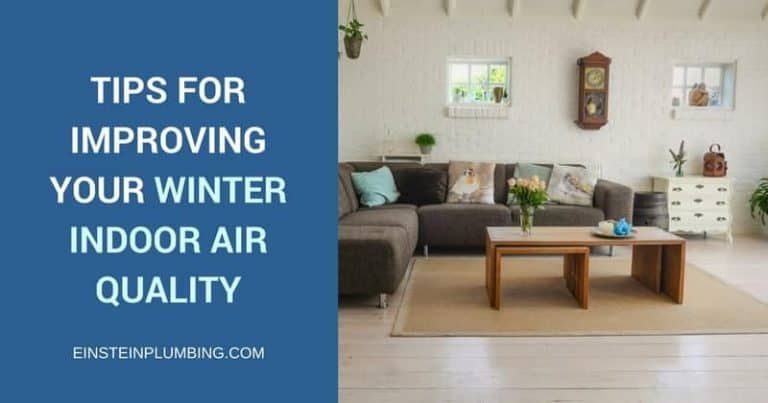Improving Winter Indoor Air Quality
Indoor air quality is a year-round issue. During the winter season, most people close off their homes to the outside world. While this is usually to keep chilly temperatures at bay, it can also affect the indoor air to get trapped inside of the home. It can result in a buildup of dust and other pollutants that continue recirculating throughout the colder months of the year. With this in mind, now is the time to take action to improve the indoor air quality in your home for the colder season ahead.
Winter Indoor Air Quality Tip #1 : Maintain Your Equipment
Don’t start the winter heating season without having your furnace inspected and tuned up in advanced. Preventative maintenance includes cleaning of sensors, heat exchangers, and checking of other parts that can affect the operation of the unit as well as your indoor air quality. You may also want to change or install a new furnace filter before the onset of heating season so that the air you will be breathing will be all clean and safe. Inspect the filter each month so sthat prompt replacement can be done.
Winter Indoor Air Quality Tip #2 : Improve the Ventilation in Your Home
Ventilation can make a tremendous difference in the indoor air quality of your home. A well-ventilated home can have a proper air circulation throughout the space consistently. While the majority of newer homes are more energy efficient, the fact is that fresh, outside air is rarely allowed indoors. Installing window and bathroom exhaust fans can help to draw in fresh air from the outside, without altering the temperatures of the home.
Indoor air is possibly much more polluted than outside air because there are multiple chemicals and elements introduced into your home’s air supply through your daily activity. Cooking emissions, laundry products, air fresheners, and office materials are just a few roots of such contaminants. If not proper ventilation is not present, it can lead to poor air quality that can cause allergies, asthma, and other respiratory issues.
Winter Indoor Air Quality Tip #3 : Manage Humidity in Your Home
The winter moisture level in your Oregon, Washington, or Nevada home will be significantly lower than the summer levels. The crisp cold air holds half as much moisture as warm air provides, making the environment naturally dry. As your furnace runs, this can exhaust much of the remaining moisture from the air supply in your home. When the humidity in your home falls below 15%, your mucous membranes will become dry, affecting your defenses against common winter illnesses. Your RH should be between 30-50%, and the following tips may help you to monitor and manage this issue:
- Use a hygrometer to measure your indoor RH levels
- Install a furnace humidifier to spread moisture into the environment
- Consider upgrading your furnace to a two-stage unit that only uses high heat levels when temperatures are in the extreme weather.
Winter Indoor Air Quality Tip #4 : Monitor for Hazardous Emissions
Carbon monoxide poisoning is more prevalent in the winter season as combustion appliances and equipment are used more often. Heating systems, fireplaces, and attached garages are some of the most common sources of the invisible but deadly gas. The following steps may help you protect your family from this issue:
- Consider installing carbon monoxide alarms in each sleeping space and on each level of your home, and also place one near attached garages.
- Have ducts examined and sealed to prevent the backdrafting of carbon monoxide into the house.
- Schedule a complete safety inspection of heating systems from a professional heating expert. You can also set this at the time of your preventive maintenance.
Winter Indoor Air Quality Tip #5 : Keep Germs at Bay
A contaminated air supply can significantly affect the health of your loved ones, making it essential to consider filtration options before the peak of the flu season arrives. An air purifier may help in eliminating irritating particulates from the air stream, enhancing your indoor air quality. Though, investing in a germicidal air cleaner is a wise choice if you desire to reduce your exposure to germs. This type of system seizes biomaterials in the airstream, killing viruses, mold, and bacteria. This tip can be a massive help if you have family members with chronic respiratory conditions.
Winter Indoor Air Quality Tip #6 : Schedule an Indoor Air Quality Evaluation
Every home has unique structural features and needs, and you may need customized help in identifying indoor air quality problems in your home. An HVAC technician from Einstein Plumbing, Heating, and Cooling can classify specific pollutants and issues, creating recommendations for the best types of equipment and plans for improving your indoor air quality.
Our heating and cooling technicians can offer recommendations about the best humidifier options, air purifiers, or ventilation based on the results of our inspection. Call us now at 888-671-7767 or email [email protected] for professional plumbing, heating & cooling, water heater, and sewer & mainline services in Oregon, Washington, and Nevada homes.
You may want to check out our other plumbing articles:
- Fix Furnace Problems Caused by Thermostat
- Best Ways to Reduce Heating Costs this Winter
- Good Top Brands For Plumbing Tools and Fixtures
- Best Halloween Attractions in Oregon
- Halloween Plumbing Safety Tips
